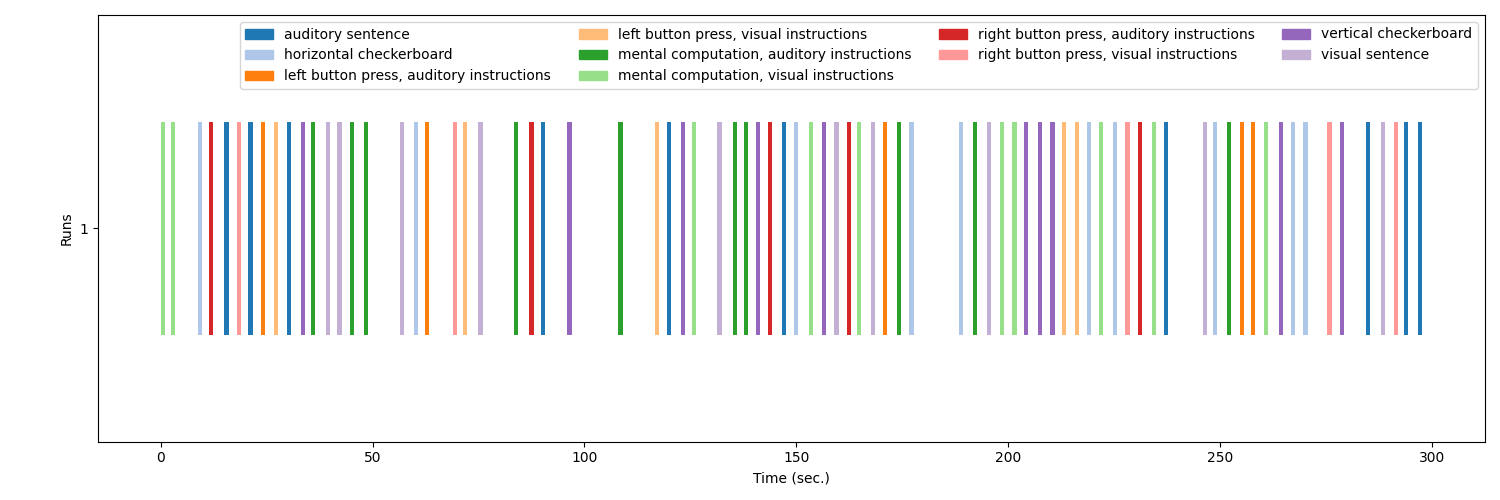Note
Click here to download the full example code or to run this example in your browser via Binder
Generate an events.tsv file for the NeuroSpin localizer task#
Create a BIDS-compatible events.tsv file from onset/trial-type information.
The protocol described is the so-called “ARCHI Standard” functional localizer task.
For details on the task, please see:
Pinel, P., Thirion, B., Meriaux, S. et al. Fast reproducible identification and large-scale databasing of individual functional cognitive networks. BMC Neurosci 8, 91 (2007). https://doi.org/10.1186/1471-2202-8-91
print(__doc__)
Define the onset times in seconds. These are typically extracted from the stimulation software used, but we will use hardcoded values in this example.
import numpy as np
onsets = np.array([
0., 2.4, 8.7, 11.4, 15., 18., 20.7, 23.7, 26.7, 29.7, 33., 35.4, 39.,
41.7, 44.7, 48., 56.4, 59.7, 62.4, 69., 71.4, 75., 83.4, 87., 89.7,
96., 108., 116.7, 119.4, 122.7, 125.4, 131.4, 135., 137.7, 140.4,
143.4, 146.7, 149.4, 153., 156., 159., 162., 164.4, 167.7, 170.4,
173.7, 176.7, 188.4, 191.7, 195., 198., 201., 203.7, 207., 210.,
212.7, 215.7, 218.7, 221.4, 224.7, 227.7, 230.7, 234., 236.7, 246.,
248.4, 251.7, 254.7, 257.4, 260.4, 264., 266.7, 269.7, 275.4, 278.4,
284.4, 288., 291., 293.4, 296.7,
])
Associated trial types: these are numbered between 0 and 9, hence corresponding to 10 different conditions.
trial_type_idx = np.array([
7, 7, 0, 2, 9, 4, 9, 3, 5, 9, 1, 6, 8, 8, 6, 6, 8, 0, 3, 4, 5, 8, 6,
2, 9, 1, 6, 5, 9, 1, 7, 8, 6, 6, 1, 2, 9, 0, 7, 1, 8, 2, 7, 8, 3, 6,
0, 0, 6, 8, 7, 7, 1, 1, 1, 5, 5, 0, 7, 0, 4, 2, 7, 9, 8, 0, 6, 3, 3,
7, 1, 0, 0, 4, 1, 9, 8, 4, 9, 9,
])
We may want to map these indices to explicit condition names. For that, we define a list of 10 strings.
condition_ids = [
'horizontal checkerboard',
'vertical checkerboard',
'right button press, auditory instructions',
'left button press, auditory instructions',
'right button press, visual instructions',
'left button press, visual instructions',
'mental computation, auditory instructions',
'mental computation, visual instructions',
'visual sentence',
'auditory sentence',
]
trial_types = [condition_ids[i] for i in trial_type_idx]
We must also define a duration (required by BIDS conventions). In this case, all trials lasted one second.
Form a pandas DataFrame from this information.
import pandas as pd
events = pd.DataFrame({
'trial_type': trial_types,
'onset': onsets,
'duration': durations,
})
Take a look at the new DataFrame
Export them to a tsv file.
import os
outdir = 'results'
if not os.path.exists(outdir):
os.mkdir(outdir)
tsvfile = outdir + '/localizer_events.tsv'
events.to_csv(tsvfile, sep='\t', index=False)
print(f'The event information has been saved to {tsvfile}')
The event information has been saved to results/localizer_events.tsv
Optionally, the events can be visualized using the
plot_event function.
import matplotlib.pyplot as plt
from nilearn.plotting import plot_event
plot_event(events, figsize=(15, 5))
plt.show()

Total running time of the script: ( 0 minutes 2.779 seconds)
Estimated memory usage: 9 MB